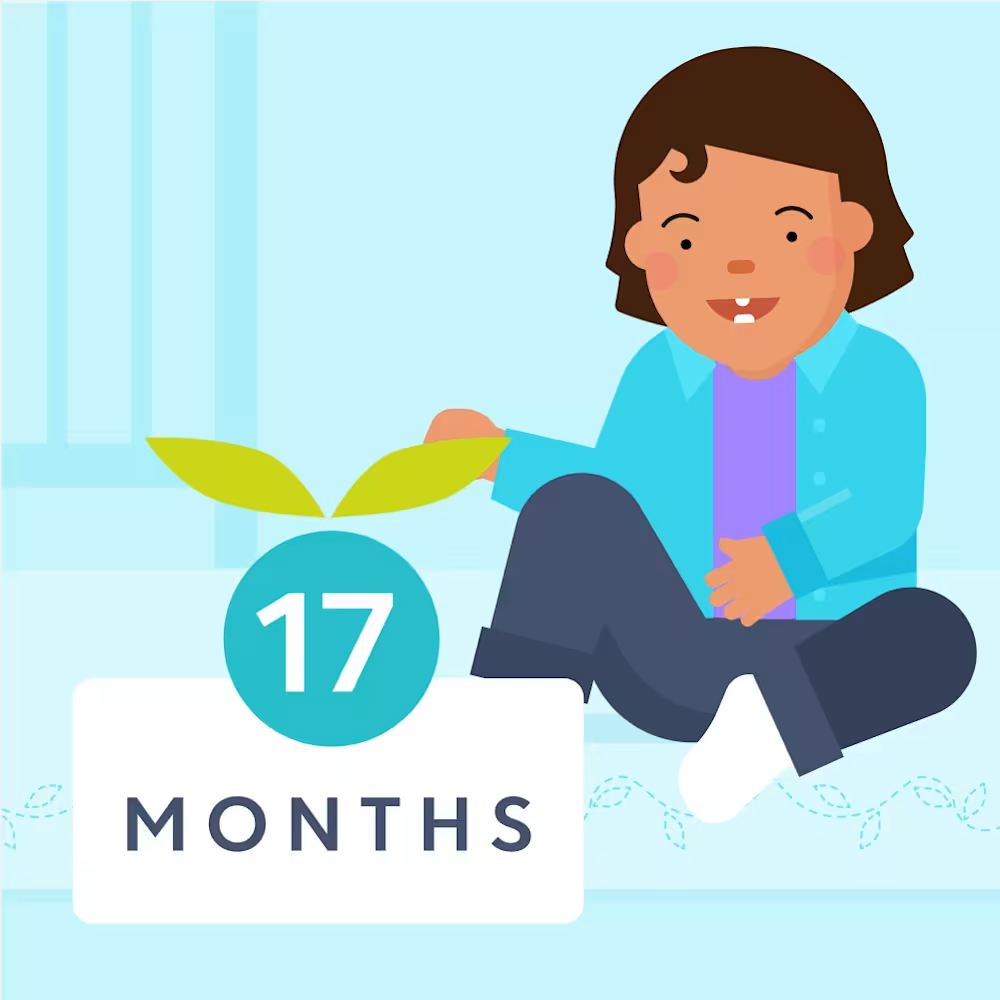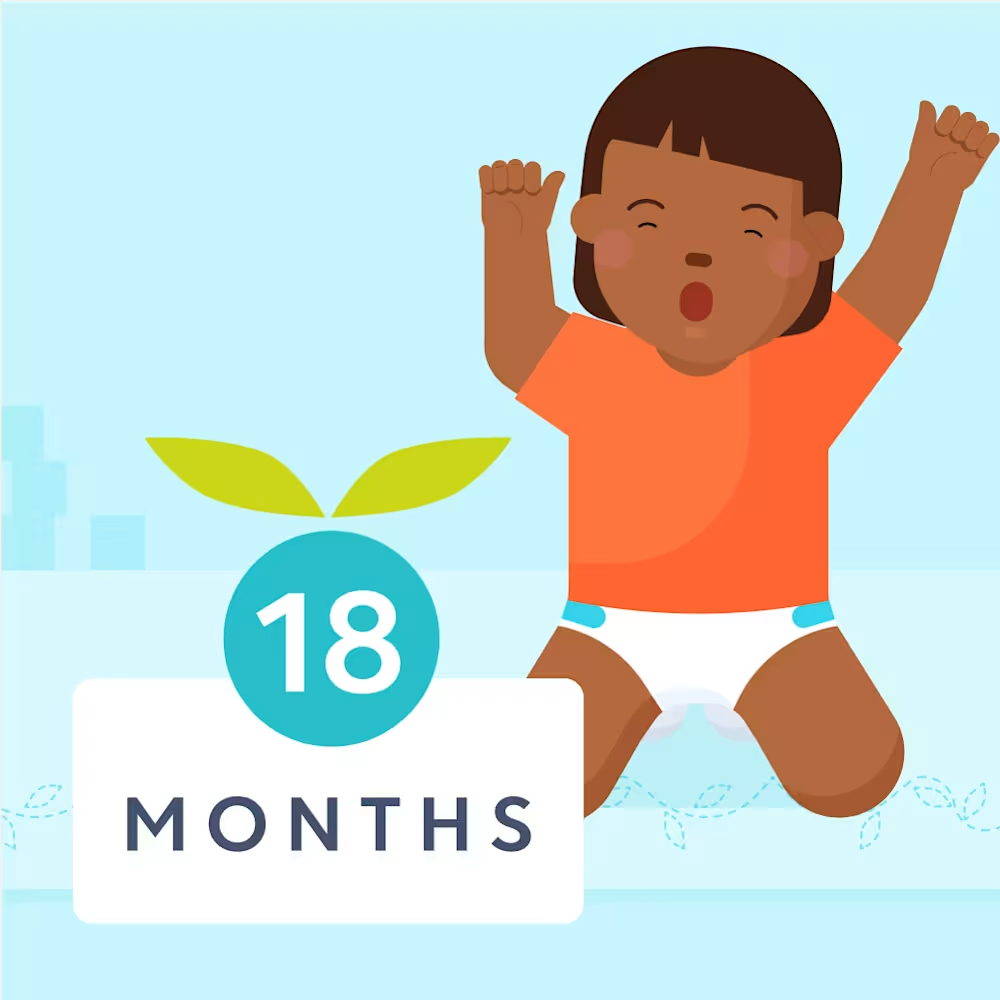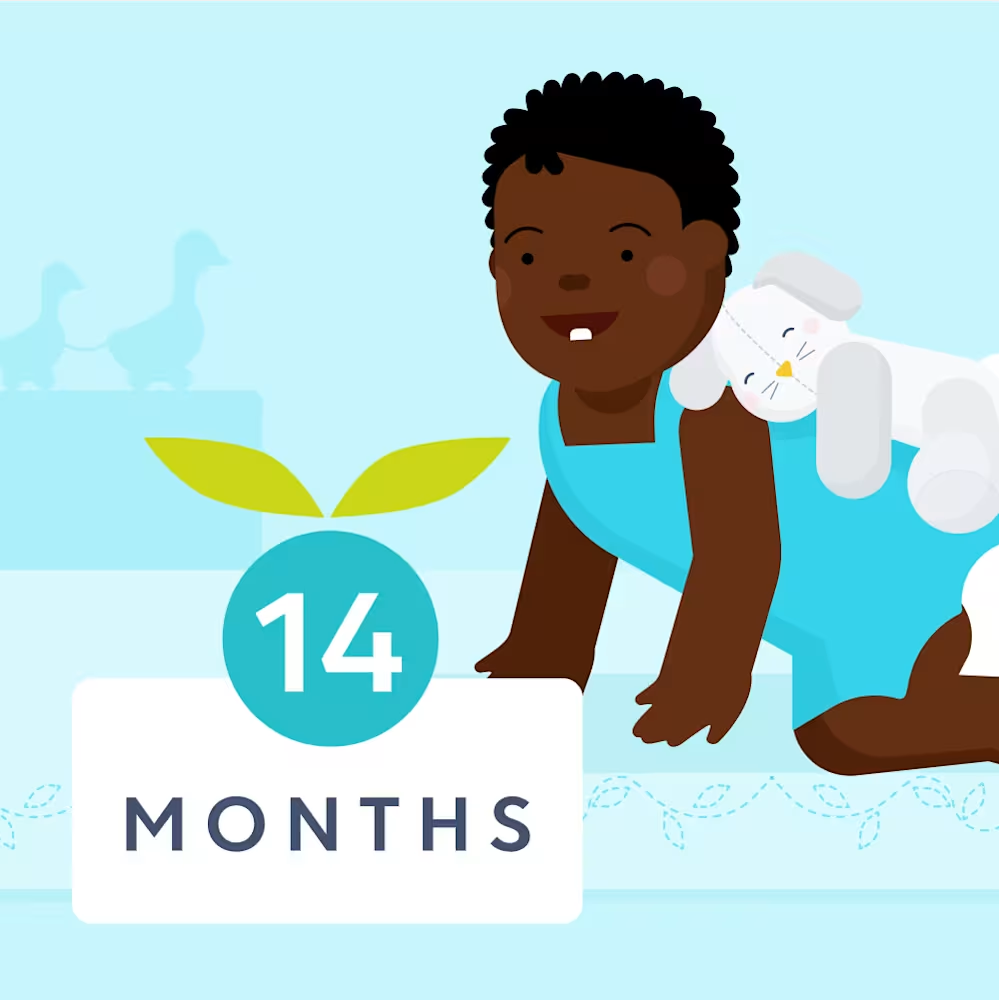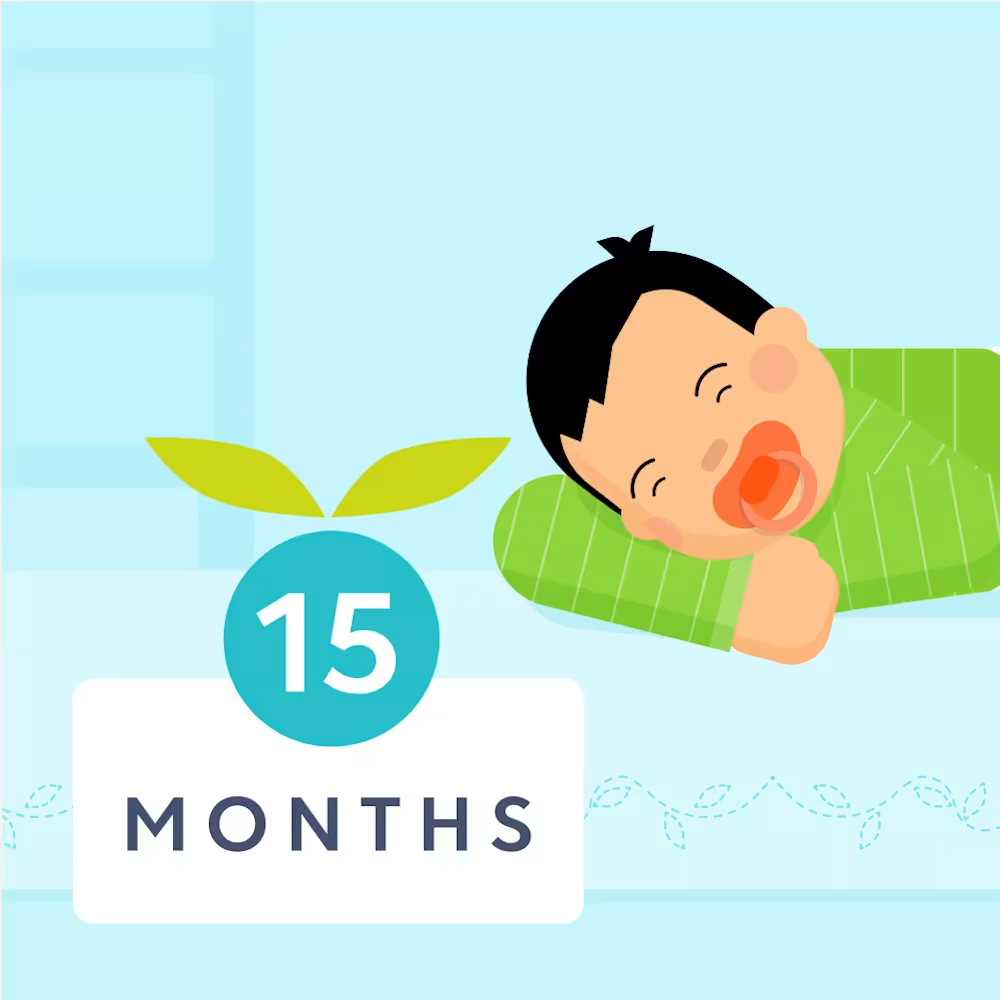16 month old sleep schedule: Bedtime and nap schedule
Updated Dec 15, 2025
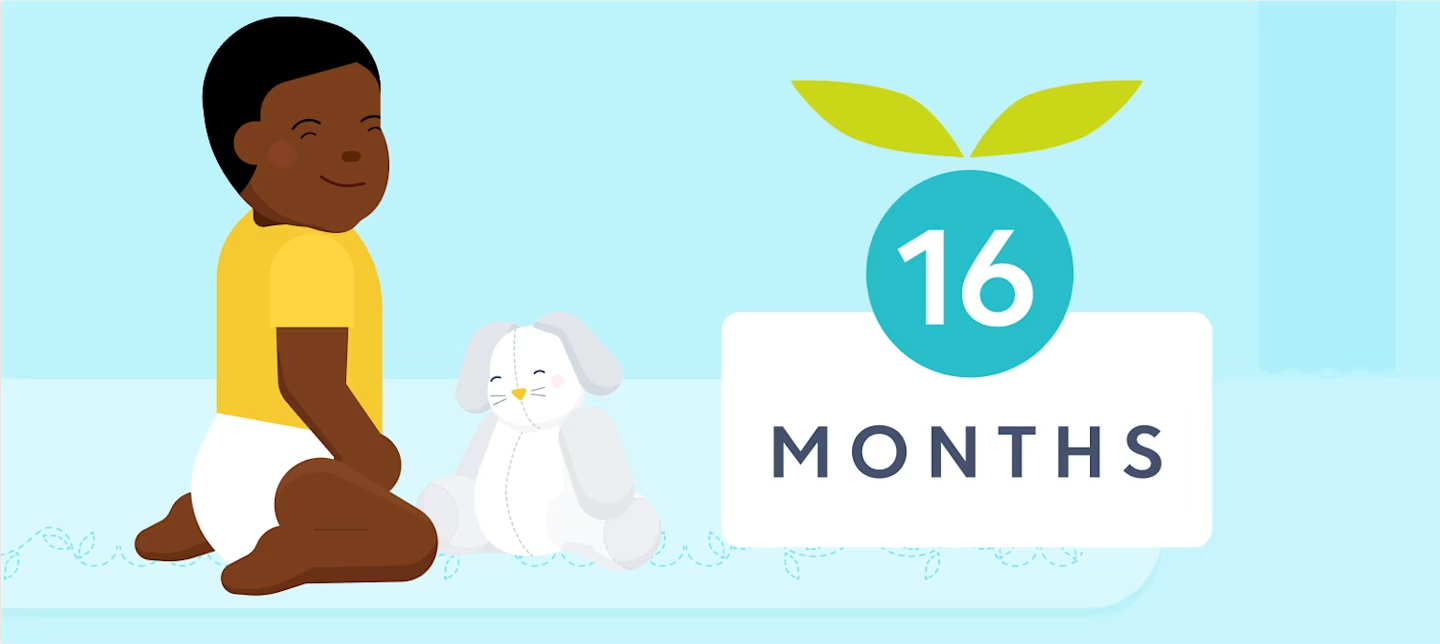
At 16 months, your busy toddler is likely working on new physical milestones like walking and with so much activity throughout the day, they need daytime and nighttime sleep to properly “recharge.”
In this article we’ll take you through a typical 16 month old sleep schedule, give you tips for teething, and the lowdown on the 2-1 nap transition.
How much should a 16 month old sleep?
At 16 months, we recommend aiming for approximately 13 - 14 hours of total sleep [] over 24 hours. This typically breaks down to about 10 - 12 hours of nighttime sleep and 2 - 3 hours of daytime sleep, split between 1 or 2 naps.
However, these suggested hours are just a rough guide. Every child has unique sleep needs. We recommend paying attention to your toddler's overall mood and energy levels as well as keeping track of their sleep to ensure they're getting the rest they need.
Here's a quick overview of what you may expect when it comes to 16 month olds and sleep. Note that these figures are averages and should be used as guidelines.
Top sleep tip for 16 month olds
At 16 months, pesky first molars may be popping through []. Due to their size and additional time they take to emerge, new molars can be more painful for children than other baby teeth. During this time, your toddler may need more comforting, especially at night. Some ways to reduce discomfort [] caused by include:
Use a clean finger to rub/massage swollen gums
Offer a teething toy or teething ring made from firm rubber/silicone to gnaw on
Chill a wet, twisted washcloth in the freezer for 30 minutes for your kiddo to chew
Treats such as homemade milk “popsicles”
Move bedtime earlier if naps have been short
Sample 16 month old sleep schedule
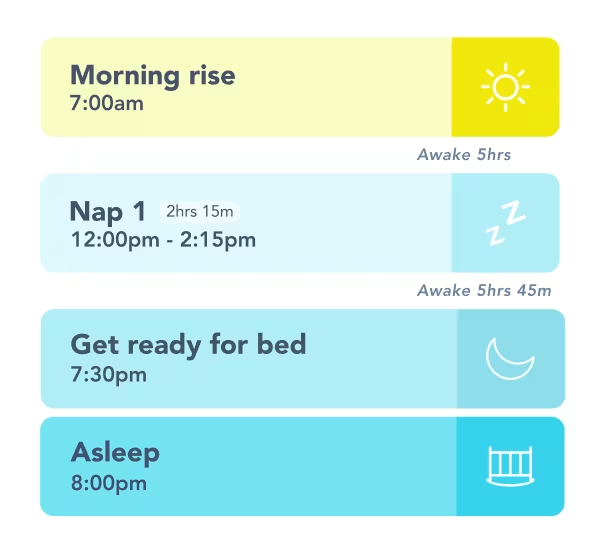
Note: Sleep needs vary by child and this chart should be viewed as an example.
Morning rise: 7:00 AM
Wake window before nap: 5 hours
Nap: 12:00 PM - 2:15 PM (2.25 hour nap)
Wake window before bedtime: 5.75 hours
Get ready for bed: 7:00 PM
Asleep: 8:00 PM
Naptime schedule for a 16 month old
Nap schedules often vary at this age. Some 16 month olds are taking just 1 nap per day, and others are still on a 2-nap schedule. For children that have transitioned to 1 nap, we hope to see about 5 hours of awake time before the nap. A typical 2-nap schedule typically includes 3.25 - 4 hours of awake time before their morning nap and 3.5 - 4 hours between the first and second naps.
If your schedule permits, it’s common for the to take a few weeks. There may be some 1-nap and some 2-nap days (like on weekends) while your kiddo adjusts to staying awake longer stretches.This is common!
How long should a 16 month old nap?
Total daytime sleep should be 2 - 3 hours for 16 month olds. When taking 2 naps, we like to see total daytime sleep split pretty evenly between both naps, with each nap lasting at least an hour. If your toddler has transitioned to, ideally it’s a 2 - 3 hour nap in the middle of the day.
How many naps for a 16 month old?
Children typically switch from 2 naps per day to one midday nap between 14 - 18 months. So it’s still common for many 16 month olds to need, at least some days. Some signs your kiddo is gearing up to drop a nap include:
Taking very short naps
Resisting one or both naps
Consistently sleeping less than 10 hours a night
2-nap schedule
1-nap schedule
Bedtime for a 16 month old
Toddlers thrive on routine. Knowing what to expect and what comes next helps them feel confident and in control. Bedtime routines have been shown to improve sleep and reduce night wakings []. At this age, we suggest routines be about 30 - 45 minutes long and include 5 or so calming routine activities [], such as bath, brushing teeth, getting dressed, reading books, and singing a couple of your child’s favorite songs. It may sound daunting, but chances are you’re doing most of these things already. Just aim to do the same activities every night in the same order to signal to your toddler’s brain that sleep is coming.
However, if it’s obvious your child is overtired (like on 1-nap days), you’ll want to quietly shorten their bedtime routine a bit to avoid unnecessary frustration and tears. Rather than skipping parts of your child’s routine altogether (which could result in a tantrum and problems settling to sleep), you may want to shorten bath time or spend a little less time reading/singing than usual.
What time should a 16 month old go to bed?
Most 16 month olds do best with around 10 - 12 hours of sleep per night to support brain development []. For many families, bedtime falls between 6:00 PM and 8:00 PM. We tend to see slightly later bedtimes for 16 month olds who are on a 2-nap schedule and earlier bedtimes once they’ve completed the transition to just 1 nap.
A consistent bedtime helps regulate your toddler’s circadian rhythm, making it easier for them to fall asleep and stay asleep. However, during a nap transition, bedtime can feel a bit unpredictable — and that’s OK! Some nights may call for an earlier bedtime if they’re extra tired, while others may be a bit later if they take a later afternoon nap. This is temporary, and once your toddler settles into a solid 1-nap schedule, bedtime will become more consistent again.
Why does my 16 month old keep waking up at night crying?
Has your 16 month started waking up and calling for you overnight again? Around this age, a few factors may be leading to increased waking in the middle of the night:
Falling asleep with assistance and desiring the same support overnight
Needing a schedule adjustment
Teething
Mastering milestones
Hunger
If you’re looking for more sleep support, consider submitting for a personalized, step-by-step Sleep Plan via .
Is there a sleep regression at 16 months?
Sleep regressions can happen at any age! Around , your toddler may go through a period of rocky sleep. Around is a common age where we see this due to contributing factors like working on physical milestones and separation anxiety. However, sleep patterns won’t go off the rails for all toddlers around this age — there's not a magical date on the calendar that dictates sleep challenges.
Can my 16 month old sleep with a pacifier?
Children can use pacifiers at 16 months during awake and sleep times. They're likely old enough to replace their paci when it inevitably falls out overnight. We recommend putting a couple in their crib after they fall asleep to increase the changes that they'll be able to find one and put it back in themselves, instead of calling out for you to help. Note: Check pacifiers periodically for wear and tear, especially if your little one has teeth. It's best to replace old ones if they've torn or turned color over time.
Can a 16 month old sleep on their stomach or side?
While the AAP still advises putting your child to bed on their back [], a 16 month old can safely sleep on their stomach or side if they roll there by themselves and can roll both front to back and back to front. Letting your toddler choose their sleep position is normal at this age.
Can I sleep train a 16 month old?
If you’re looking to remove parent-led sleep associations (e.g. rocking or feeding to sleep) in favor of teaching your child to fall asleep on their own, sleep training can be a useful tool . Note that there are of sleep training and caregivers should pick the style that suits their child and parenting preferences. Not all of them are “cry it out” methods — some are slower and more gradual while others are faster and prioritize results.
What are the developmental milestones for a 16 month old?
At , your baby is likely on the move and working on speaking and understanding new words. Here are some things they may be doing and trying this month:
Walks well
May walk backwards
May walk upstairs with assistance
Tries to use utensils and drink from a cup
Scribbles spontaneously
Builds a two-block tower (15 - 17 months)
Can say a few words or more
Understands and follows simple instructions
May begin to use two-word phrases (16 - 24 months)
Combines sounds and actions (points to water and says “wawa”)
Does a 16 month old need to eat during the night?
Most children at 16 months can go the whole night without eating. However, if your little one is waking overnight (or very early in the morning) due to hunger, we recommend looking at what time they're eating dinner. If their mealtime is on the early side, consider offering a healthy snack before bed or moving dinner a little later. Sometimes going 12+ hours between dinner and breakfast is tricky for kids!
Takeaway
At 16 months, we recommend aiming for approximately 13 - 14 hours of total sleep over 24 hours. This often breaks down to about 10 - 12 hours of nighttime sleep and 2 - 3 hours of daytime sleep, split between 1 or 2 naps.
Split nights — where a toddler wakes up for long periods overnight — can be a sign that they’re ready to transition from two naps to one. Other signs of needing a schedule adjustment include taking short naps, resisting one (or both) naps, and consistently sleeping less than 10 hours at night.
We suggest a bedtime routine that lasts around 30 - 45 minutes at this age. Children at 16 months often need a little more time to wind down and thrive on routine and knowing what comes next.
If you're curious about what lies ahead in the coming month, glimpse into the future to see what you might experience once your baby is on a . Also check out a to see how far your little one has come.
Share article:
Note: The content on this site is for informational purposes only and should not replace medical advice from your doctor, pediatrician, or medical professional. If you have questions or concerns, you should contact a medical professional.
8 Sources
Share article:
